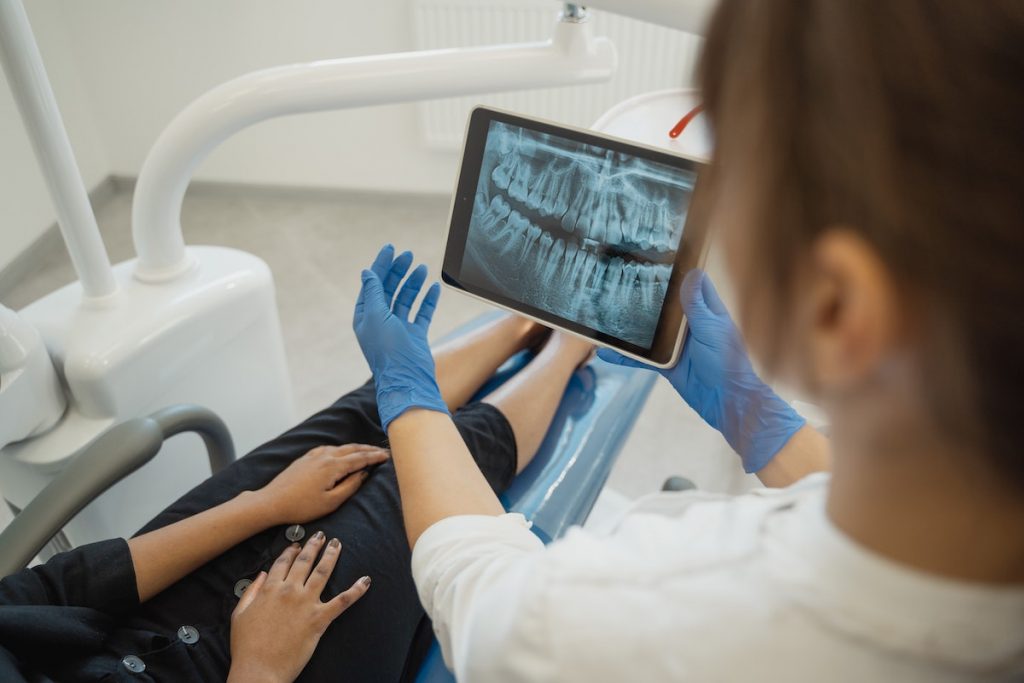- Start slow and steady by introducing easy-to-chew foods into your diet when first getting dentures.
- Avoid sticky foods until you are more comfortable with eating and wearing dentures.
- Practice good oral hygiene, including brushing twice a day and soaking overnight in a denture-cleaning solution or lukewarm water.
- Be mindful of the temperature, as hot and cold food can cause discomfort when wearing dentures.
- Visit your dentist regularly for checkups and adjustments to make sure everything fits correctly.
Eating is one of life’s great pleasures. But for those wearing dentures, the experience can be a bit frustrating. There may be worries that the dentures will slip or food may get stuck. Don’t worry—eating with dentures doesn’t have to be difficult. Explore how to make your food trip enjoyable, even when wearing dentures.
Start Slow and Steady
When you first get your dentures, you may feel in the blind and unsure if what you do is right. The best and safest thing to do is to start slow and steady. Here’s how it works:
Start with Easy-to-Chew Food
Ease into eating with dentures by starting with soft foods that are easy to chew. These include yogurt, mashed potatoes, oatmeal, and other soft-cooked vegetables. Take small bites and chew slowly so you can get used to the feel of your new teeth.
Make Your Transition Gradual
Once you feel more comfortable with softer foods, start introducing more solid foods into your diet. This can be done gradually so that your dentures have time to adjust to the food’s different shapes and textures. Introduce one new type of food at a time, such as cooked rice or ground beef, and then slowly increase the variety over time. Don’t start yet with candies or anything too chewy.
Avoid Sticky Foods
Sticky foods like caramels and gummies can be difficult to eat with dentures, as they tend to get stuck in the teeth and cause discomfort. Avoid these types of food until you are more comfortable eating and wearing your dentures.
Practice Good Oral Hygiene

Like when you still have natural teeth, good oral hygiene is key to enjoying your meals with dentures. However, dentures have special needs. Here’s how you can keep them clean and safe:
Brushing Your Dentures
Especially if you have a full set of dentures, brushing them twice a day is important. Use a soft-bristled toothbrush and mild soap with warm water. Gently brush away food particles from the surfaces and edges of your dentures. Ensure you clean all surfaces—front, back, top, and bottom. This will be easier since you can see all the surfaces of your dentures.
Soaking Your Dentures
When not in use, it’s important to keep your dentures moist. This prevents them from drying out and losing their shape. Make sure you soak them overnight in a denture-cleaning solution or in lukewarm water with a pinch of salt.
Be Mindful of the Temperature
It’s important to remember that your mouth may be unable to sense temperature changes in food like before getting dentures. That means hot or cold food could cause discomfort if you don’t pay attention.
The Risks of Eating Hot Food
Eating hot food with dentures can cause serious burns, as the dentures act like heat conductors. This may cause damage to your gums and dentures. To avoid this, wait until the food has cooled off before putting it in your mouth.
The Risks of Eating Cold Food
Eating cold food with dentures can also cause discomfort. Since the denture material differs from your gums and tooth enamel, cold temperatures may irritate them or even cause them to crack. To avoid this, wait until your food is near room temperature before eating it.
Visit Your Dentist Regularly

Getting your dentures means having a responsibility to maintain them. This means you must visit your dentist regularly for checkups and adjustments. Adjustments are necessary, as dentures may shift in your mouth over time, and it is important to have a professional make sure that everything fits correctly. Here are other things your trusted dentist can do for you:
- Clean and polish your dentures
- Make adjustments to increase the comfort of your dentures
- Replace worn-out denture parts
- Provide tips and advice on how to properly care for them
Just follow your dentist’s advice for the best possible results.
Signs Your Dentures are not the Right Fit
Knowing when your dentures are not the right fit can help you get them adjusted. Here are some signs you should look out for:
- Pain or discomfort while eating
- Slipping of dentures in your mouth
- Gum irritation or soreness
- Difficulty speaking clearly
- Bad breath and a bad taste in your mouth
If you experience any of these symptoms while wearing dentures, contact your dentist immediately to avoid further damage to your mouth.
Having dentures does not mean you can’t enjoy your meals. With the right tips and advice, you’ll be able to enjoy a meal without worrying about your dentures slipping or food getting stuck in them. And with proper care and regular visits to your dentist, eating with dentures can be just as enjoyable as it used to be.


